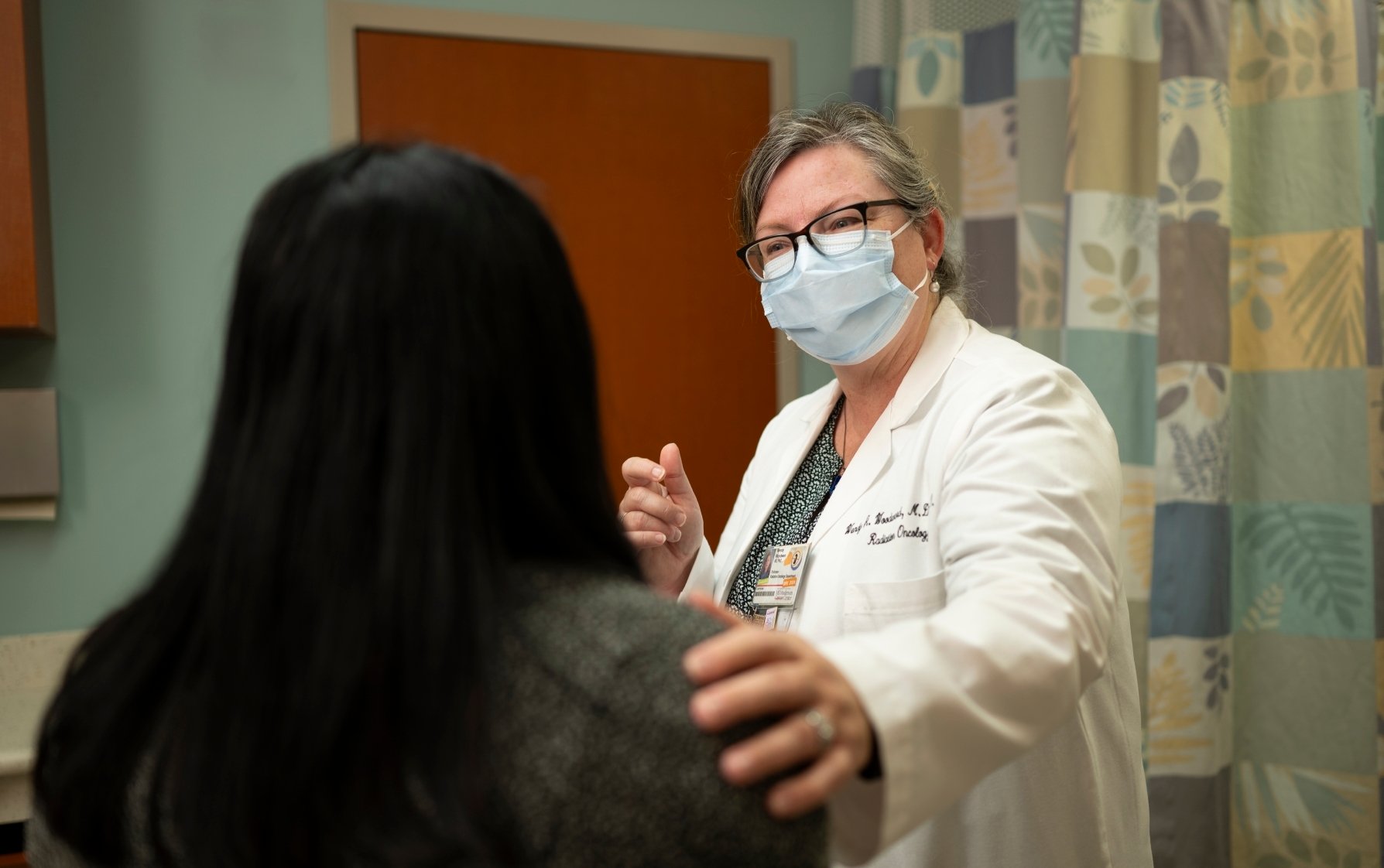- Diseases
- Acoustic Neuroma (14)
- Adrenal Gland Tumor (24)
- Anal Cancer (68)
- Anemia (2)
- Appendix Cancer (16)
- Bile Duct Cancer (26)
- Bladder Cancer (72)
- Brain Metastases (28)
- Brain Tumor (232)
- Breast Cancer (714)
- Breast Implant-Associated Anaplastic Large Cell Lymphoma (2)
- Cancer of Unknown Primary (4)
- Carcinoid Tumor (8)
- Cervical Cancer (158)
- Colon Cancer (166)
- Colorectal Cancer (116)
- Endocrine Tumor (4)
- Esophageal Cancer (44)
- Eye Cancer (36)
- Fallopian Tube Cancer (8)
- Germ Cell Tumor (4)
- Gestational Trophoblastic Disease (2)
- Head and Neck Cancer (12)
- Kidney Cancer (128)
- Leukemia (342)
- Liver Cancer (50)
- Lung Cancer (286)
- Lymphoma (278)
- Mesothelioma (14)
- Metastasis (30)
- Multiple Myeloma (100)
- Myelodysplastic Syndrome (60)
- Myeloproliferative Neoplasm (4)
- Neuroendocrine Tumors (16)
- Oral Cancer (100)
- Ovarian Cancer (172)
- Pancreatic Cancer (160)
- Parathyroid Disease (2)
- Penile Cancer (14)
- Pituitary Tumor (6)
- Prostate Cancer (146)
- Rectal Cancer (58)
- Renal Medullary Carcinoma (6)
- Salivary Gland Cancer (14)
- Sarcoma (238)
- Skin Cancer (296)
- Skull Base Tumors (56)
- Spinal Tumor (12)
- Stomach Cancer (64)
- Testicular Cancer (28)
- Throat Cancer (92)
- Thymoma (6)
- Thyroid Cancer (96)
- Tonsil Cancer (30)
- Uterine Cancer (80)
- Vaginal Cancer (16)
- Vulvar Cancer (20)
- Cancer Topic
- Adolescent and Young Adult Cancer Issues (20)
- Advance Care Planning (10)
- Biostatistics (2)
- Blood Donation (18)
- Bone Health (8)
- COVID-19 (362)
- Cancer Recurrence (120)
- Childhood Cancer Issues (120)
- Clinical Trials (630)
- Complementary Integrative Medicine (22)
- Cytogenetics (2)
- DNA Methylation (4)
- Diagnosis (232)
- Epigenetics (6)
- Fertility (62)
- Follow-up Guidelines (2)
- Health Disparities (14)
- Hereditary Cancer Syndromes (126)
- Immunology (18)
- Li-Fraumeni Syndrome (8)
- Mental Health (116)
- Molecular Diagnostics (8)
- Pain Management (62)
- Palliative Care (8)
- Pathology (10)
- Physical Therapy (18)
- Pregnancy (18)
- Prevention (914)
- Research (392)
- Second Opinion (74)
- Sexuality (16)
- Side Effects (604)
- Sleep Disorders (10)
- Stem Cell Transplantation Cellular Therapy (216)
- Support (402)
- Survivorship (320)
- Symptoms (182)
- Treatment (1786)
Coping with cancer: Where spirituality comes in
BY Molly Adams
3 minute read | Published October 24, 2019
Medically Reviewed | Last reviewed by an MD Anderson Cancer Center medical professional on October 24, 2019
Spirituality can mean different things to different people. Prayer to a higher power, connecting with nature or creating a work of art can all be ways of expressing spirituality. A cancer diagnosis or the challenges of treatment can influence your spirituality by strengthening your beliefs or bringing them into question.
We recently spoke with social work counselors Annabelle Bitter and Tiffany Meyer about the role spirituality can play for cancer patients and caregivers. Here’s what they had to say.
Spirituality and religion are different
While religion and spirituality may be similar for some people, they’re not the same thing.
“Spirituality is a relationship you have with a higher power that gives you meaning or purpose,” Bitter says. Spirituality means something different for each of us, and we express it in our own ways.
Religion, on the other hand, is usually more structured, with a set of beliefs and standards shared by a group of people. “You can be religious and not necessarily spiritual. You can be spiritual and religious, or you can be spiritual but not religious,” Bitter says.
“What I love about spirituality is it varies from person to person, but it’s all about what gives you a sense of connection,” Meyer adds.
When cancer puts faith into question
Fear, doubt and anger are all normal emotions when facing a cancer diagnosis. These emotions can cause you to question your spiritual beliefs.
Patients or caregivers may ask, “Why me?” This may be especially true if you feel you’ve been faithful or lived a good life based on your spiritual beliefs.
These crises of faith are an important part of spiritual development, according to Bitter and Meyer.
“But the reality is that no matter how spiritual or faithful we are, there’s so much that we don’t have control over,” says Bitter. “Give yourself permission to feel anger and even question your faith.”
By allowing yourself to feel this way, you may come to a place of acceptance or a better understanding of your feelings, which may help you move on.
Spirituality may provide connection and comfort to help you cope with a cancer diagnosis
While having a spiritual or religious foundation can’t change your diagnosis or the effectiveness of treatment, some patients find their beliefs help them find meaning and cope. “It may not impact your prognosis, but it can help improve your overall outlook during treatment,” Meyer says.
By connecting with a higher power, caregivers may accept a loved one’s diagnosis or possibly become grateful for the opportunity to provide care.
“I often hear people say, ‘I won’t be given more than I can handle,’” Meyer notes. “For a lot of people, that offers a great sense of comfort.”
Support from a spiritual community may help patients and caregivers feel more connected when dealing with the uncertainty of cancer. “People say talking with their faith community helps them feel less isolated,” Meyer says. “That sense of connection through this difficult time is really powerful.”
Don’t be afraid to ask for support
Talking to your care team about your emotional needs is the first step in making sure they’re taken care of, whether you have a strong spiritual connection or not. “We all tend to feel like whatever’s going on in our head isn’t valid or that other people can’t relate, but that’s just not true,” Meyer says.
Support groups can also help you navigate these feelings. “Talking with others in similar situations can help you look at things with more compassion and understanding,” Meyer adds.
MD Anderson patients can get additional spiritual support from our Integrative Medicine Center and psychiatrists and through our Denominational Programs.
“People connect in different ways, so it’s important to find the one that works for you,” Meyer says. “Don’t be afraid to ask.”
Request an appointment at MD Anderson online or by calling 1-877-632-6789.

Spirituality can help you find meaning during difficult times.
Annabelle Bitter
Social Work Counselor





